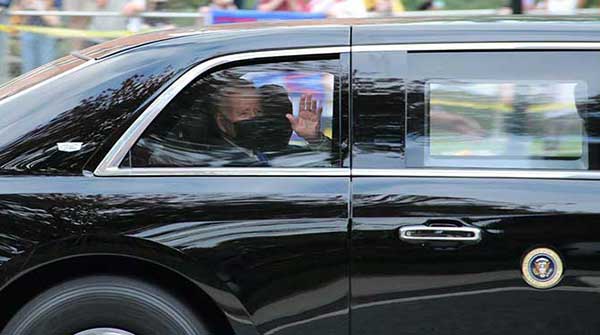Biden breaks his word: Pardoning Hunter sets dangerous precedent for Presidential power abuse

For interview requests, click here
U.S. President Joe Biden announced on Sunday that he would pardon his son, Hunter, from facing federal convictions in Delaware and California. The pardon also covered all offences that his son “has committed or may have committed or taken part in during the period from Jan. 1, 2014 through Dec. 1, 2024.”
This decision was a complete reversal from Biden’s previous position. He told ABC News anchor David Muir on June 6 that he would accept the trial outcome in Delaware. When asked if he would rule out a pardon, the President answered, “Yes.”
Biden’s decision to grant a pardon was a poor one. While there are various reasons why he granted the pardon, including the obvious fact that Hunter is his son, the use of a pardon in this particular instance set a terrible precedent that President-elect Donald Trump and future occupants of the Oval Office may exploit for their own purposes.
To understand why, let’s explore the history, impact and power of a presidential pardon.
Article II, Section 2, Clause 1 of the U.S. Constitution deals specifically with the President’s ability to grant reprieves and pardons. It reads:
 Image by Liam Enea |
| Recommended |
| What does Trump’s win mean for Canada’s left-wing parties?
|
| Key takeaways from the American election
|
| Trump’s victory a stark rejection of woke “progressivism”
|
The President shall be Commander in Chief of the Army and Navy of the United States, and of the Militia of the several States, when called into the actual Service of the United States; he may require the Opinion, in writing, of the principal Officer in each of the executive Departments, upon any Subject relating to the Duties of their respective Offices, and he shall have Power to grant Reprieves and Pardons for Offences against the United States, except in Cases of Impeachment.
Many Presidents have used reprieves and pardons since the days of George Washington. There have been two exceptions. William Henry Harrison didn’t have a chance to use the pardon. He contracted pneumonia three weeks after his inauguration and died from enteric fever after only serving for one month (Mar. 4 to Apr. 4, 1841). James A. Garfield didn’t have a chance to use it, either. He was shot on Jul. 2, 1881, survived the assassin’s bullet, contracted a massive infection and died on Sept. 19, 1881.
Who used it the least? Washington granted 16 pardons. His successor, John Adams, granted 20. The other Presidents with low numbers are Biden (26 to date), Zachary Taylor (38, but he died after only 16 months in office) and George H.W. Bush (77).
Who used it the most? Franklin D. Roosevelt granted 3,687 pardons over three full terms and a short fourth term. Woodrow Wilson recorded 2,480 pardons. Harry Truman finished at 2,044. Seven other Presidents topped 1,000 pardons – Barack Obama (1,927), Calvin Coolidge (1,545), Herbert Hoover (1,385), Ulysses S. Grant (1,332), Lyndon Johnson (1,187), Dwight Eisenhower (1,157) and Grover Cleveland (estimated at 1,107).
Presidential pardons and reprieves have been granted to a wide variety of individuals, including politicians, spies, abolitionists, journalists, religious leaders, draft dodgers, convicted criminals, sports figures and ex-Confederate soldiers. Some names have been recommended to Presidents by individuals, groups, friends and relatives, while others have been specifically chosen by the President himself.
When you consider all the controversial presidential pardons, and there have been many, Biden made the worst decision of them all.
Here are several reasons why.
- Biden did something that’s extremely rare: he pardoned a family member. There are only two instances of this. Bill Clinton pardoned his half-brother, Roger, while Trump pardoned Charles Kushner, his son-in-law’s father. It’s a short list, and he’s joined it.
- Biden pardoned his own flesh and blood. That’s never happened before. It was always viewed as one of the major political taboos, along with a self-pardon. That’s no longer the case in U.S. politics, thanks to Biden.
- Biden lied about his intentions to pardon his son. Even if you felt he would always do it before leaving office or had no other choice, he went on the record saying that he wouldn’t do it. This lie will undoubtedly tarnish his political career and legacy. His reversal even infuriated some Democrats, and you can certainly understand their position.
- Biden’s son is a criminal. Sounds pretty harsh, but if you want to keep describing Trump with this label, then you have to do the same thing with Hunter Biden.
Jonathan Turley, a well-respected law professor and legal analyst, made this astute analysis on X on Dec. 1, “With this pardon, Joe Biden shredded any residue of veracity and credibility as president. For years, he was repeatedly asked if he met any of his son’s clients. He lied and denied it. He was repeatedly asked if he was aware of Hunter’s foreign dealings. He repeatedly lied and denied it. He was asked if he would pardon his son. He repeatedly lied and denied it.”
We know that Biden loves his son and wants to protect him. By interfering in a legal matter where he has muddied the political waters for years, he’s permanently tainted the historical role of the presidential pardon. The U.S. will feel the effects of his poor judgment for many years to come.
Michael Taube is a political commentator, Troy Media syndicated columnist and former speechwriter for Prime Minister Stephen Harper. He holds a master’s degree in comparative politics from the London School of Economics, lending academic rigour to his political insights.
Explore more on Joe Biden, U.S. politics
The views, opinions, and positions expressed by our columnists and contributors are solely their own and do not necessarily reflect those of our publication.
© Troy Media
Troy Media is committed to empowering Canadian community news outlets by providing independent, insightful analysis and commentary. Our mission is to support local media in building an informed and engaged public by delivering reliable content that strengthens community connections, enriches national conversations, and helps Canadians learn from and understand each other better.

